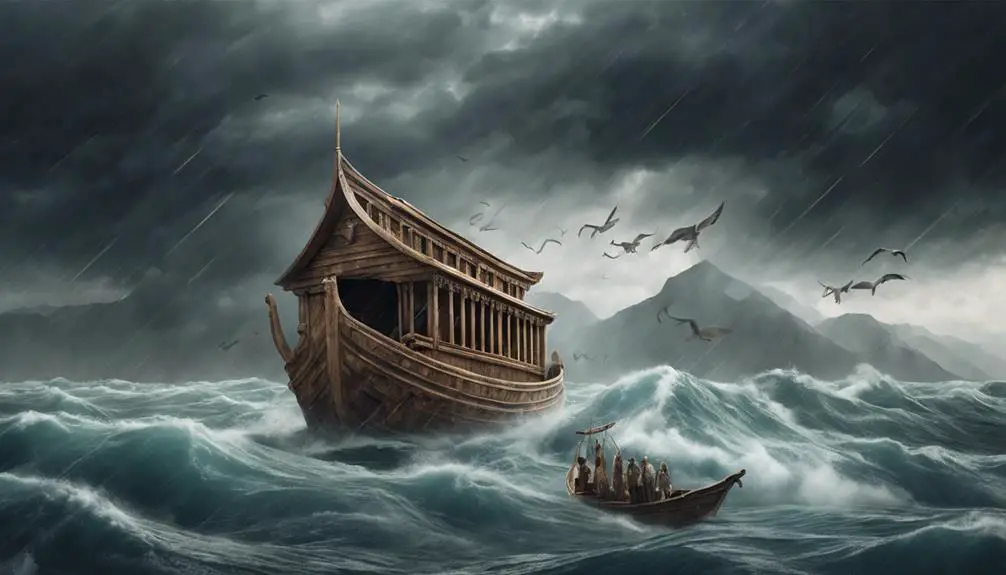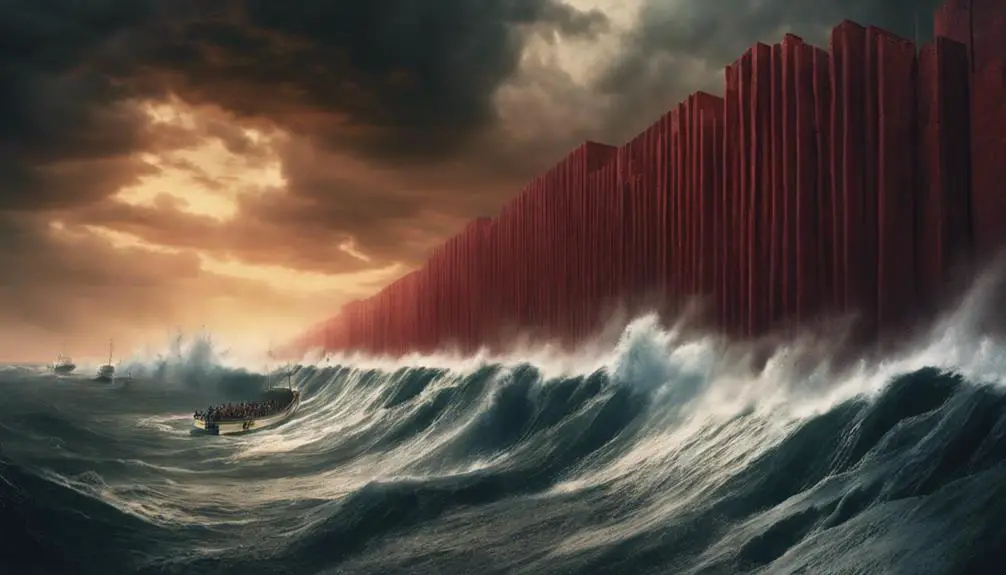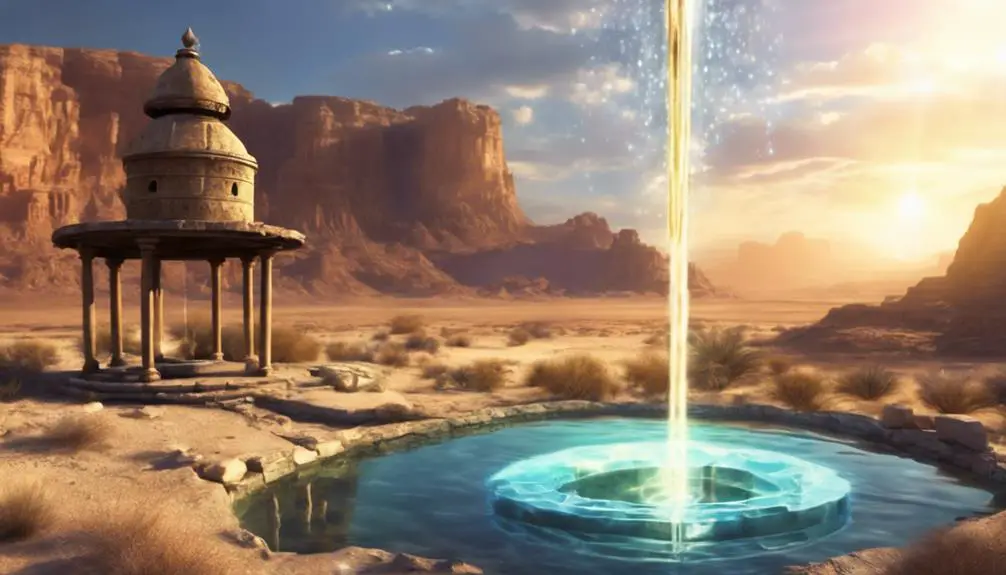Navigate the deep waters of the Bible to uncover the profound symbolism and mystery that water embodies, inviting a transformative exploration of faith.

The Mystery of Water in the Bible
You might not be aware, but water's presence in the Bible carries a profound symbolism that extends beyond its life-sustaining properties.
From the waters of Creation to the pivotal moments of the Great Flood, Crossing the Red Sea, and the rivers of healing, each instance holds a deeper significance in the narrative of faith and human experience.
As we explore these biblical waters, you'll discover layers of meaning that could transform your understanding of these ancient texts.
So, why should you keep contemplating this mystery? Because what lies beneath the surface might just change the way you see the world.
Key Takeaways
- Water symbolizes purification, spiritual growth, and the presence of the divine in biblical narratives.
- It serves as a crucial element for life, both physically and spiritually, signifying God's sustenance and care.
- Miraculous events involving water highlight God's authority over nature and the transformative power of faith.
- Biblical stories and prophecies use water to represent divine judgment, renewal, and the journey from chaos to divine order.
Waters of Creation

In the Genesis narrative, water serves as a foundational element of creation, symbolizing both chaos and order as God speaks the universe into existence. This juxtaposition highlights water's dual nature, embodying not just the formless void from which life emerges but also the divine order that structures the cosmos. Here, water's cosmic symbolism is palpable, representing the primordial substance that precedes creation.
As you delve deeper, you'll notice that water, in this context, isn't merely a physical entity. It's imbued with profound theological significance, acting as a conduit for the divine presence. This isn't accidental; in ancient Near Eastern cultures, water was often seen as a symbol of life and fertility, deeply intertwined with the divine. The biblical narrative adopts and adapts this symbolism, positioning water at the very heart of God's creative act.
Thus, when you consider water's role in the Genesis creation story, you're not just observing a literal account of the world's physical formation. You're witnessing a rich tapestry of symbolic meanings, where water stands at the intersection of chaos and order, the material and the divine. This narrative invites you to ponder the deep connections between the cosmic order and the divine presence that pervades it.
The Great Flood

Exploring further, you'll find that water's role in the biblical narrative takes on a dramatically different dimension with the story of the Great Flood. Unlike the waters of creation, which foster life and order, the Flood waters represent divine judgment and a reset of creation's moral compass. This event isn't just a catastrophic deluge but a pivotal moment where water becomes a tool for both destruction and renewal.
The Ark construction, commanded by God to Noah, serves as a tangible symbol of divine mercy amidst judgment. It's a meticulous project, emphasizing salvation for the righteous and innocent. This narrative highlights a complex relationship between humanity and the divine, mediated through water's destructive and preservative powers.
Following the receding waters, the rainbow covenant marks a significant shift. It's a promise from God, a reassurance of never again using a global flood as a means of judgment. This covenant not only illustrates a divine commitment to humanity and all living creatures but also repositions water from an element of destruction to one of hope and continuity.
Thus, the Great Flood story encapsulates water's dual nature in biblical symbolism—destructive yet life-preserving, a means to enact divine justice, and a symbol of God's everlasting covenant with creation.
Crossing the Red Sea

Another pivotal instance where water plays a transformative role in biblical narratives is the Crossing of the Red Sea, showcasing divine intervention and deliverance for the Israelites. This event not only symbolizes a miraculous escape from bondage but also marks Pharaoh's defeat, underscoring water's dual role as both a barrier and a pathway to salvation.
Consider these elements to visualize the scene:
- The Imposing Waters: The Red Sea, representing insurmountable obstacles and the fear of the unknown.
- Moses' Staff: A symbol of divine authority, turning the impossible into the possible.
- The Parting of the Sea: A miraculous intervention, creating a dry path amidst walls of water, emphasizing deliverance and the power of faith.
- The Engulfing Return: The waters' collapse, signifying Pharaoh's defeat and the finality of the Israelites' escape.
This narrative, rich in imagery and symbolism, offers a profound exploration of faith, obedience, and divine will. It serves as a reminder of the transformative power of water, not just as a physical substance, but as a vehicle for divine action and human salvation.
Rivers of Healing

Rivers of healing, throughout biblical narratives, symbolize a profound transformation and renewal for those who encounter their waters. These flowing bodies aren't just physical entities but imbued with deep spiritual symbolism. They're not merely settings for stories; they represent pivotal moments of purification and sanctification. In analyzing these texts, you'll find that rivers serve as more than just backdrops. They're active agents in the narrative, facilitating change and offering healing.
Diving deeper, you'll notice that purification rituals often take place at these rivers, signifying a washing away of the old and the emergence of a renewed spirit. This isn't accidental. The deliberate choice to set these transformative experiences by rivers underscores their significance in spiritual cleansing and rebirth. It's as if the flow of the river mirrors the spiritual journey from impurity to sanctity, from sickness to health.
Such narratives encourage you to see beyond the literal, to interpret the rivers as conduits of divine healing and transformation. This analysis reveals the complexity of water's role in biblical stories, highlighting how it's woven into the fabric of spiritual enlightenment and renewal.
Walking on Water

Building on the theme of water as a symbol of spiritual transformation, the miraculous event of walking on water in the Bible offers a unique lens through which to view faith and divinity. This narrative isn't just a tale; it's a profound exploration of miraculous faith intersecting with human doubt and fear. Historical interpretations have varied, but the core message remains a powerful testament to the potential of faith to transcend natural laws.
Consider these imagery-inducing elements:
- The dark, tumultuous sea beneath a starlit sky, symbolizing the chaos and fear that often accompany human life.
- A solitary figure, emanating calm and control, gliding above the water's surface, illustrating the divine overcoming the natural.
- The astonished faces of the disciples, a mixture of fear, awe, and eventual understanding, representing the journey from doubt to faith.
- The gentle words of encouragement, 'Do not be afraid,' cutting through the storm, offering a beacon of hope and faith amidst adversity.
These elements together paint a vivid picture of the event, inviting you to reflect on the depth of your own faith and the possibility of the miraculous in your life.
Living Water

In the biblical narrative, 'living water' emerges as a profound metaphor, encapsulating not just physical sustenance but also offering a deeper, spiritual nourishment that quenches the soul's thirst. This concept transcends mere hydration, delving into the realms of spiritual renewal and cleansing. You'll find that living water serves as a pivotal symbol, addressing the innate spiritual thirst humans possess, a yearning for something beyond the tangible and ephemeral.
Analyzing the texts, you discern that living water is intricately linked with baptism symbolism. This sacramental act not only signifies purification but also represents the believer's rebirth through water and the Spirit. The waters of baptism are, therefore, not stagnant but alive, echoing the transformative power of living water mentioned throughout scripture.
In this context, living water doesn't simply quench physical thirst but addresses a deeper, existential quest for meaning, belonging, and connection with the divine. It's an invitation to immerse oneself in the flow of divine grace that sustains, purifies, and revitalizes. As you delve deeper, you'll appreciate how this metaphor beautifully encapsulates the essence of spiritual seeking and fulfillment, highlighting water's role not just in physical life but in the spiritual journey toward enlightenment and rebirth.
Frequently Asked Questions
How Does the Symbolic Use of Water in the Bible Compare to Its Use in Other Ancient Religious Texts and Mythologies?
You'll find that the symbolic use of water, including water deities and flood narratives, is a common thread across ancient religious texts and mythologies, not just in the Bible.
These elements serve as metaphors for creation, destruction, and purification.
While the Bible presents water in contexts like baptism and the Great Flood, other cultures depict water deities as creators or destroyers, highlighting water's dual nature as both life-giving and catastrophic.
What Role Does Water Play in the Biblical Laws of Purification and Rituals, Outside the Stories of Miracles and Creation?
In biblical purification laws, water isn't just H2O; it's a key player in cleansing rituals, holding deep symbolic value. Beyond miracles and creation stories, water facilitates physical and spiritual purification, pivotal in practices like Baptism.
This symbolism isn't arbitrary; it's rooted in ancient traditions, reflecting a profound understanding of water's purifying essence. Analyzing these rituals offers insights into the complex interplay of tradition, symbolism, and the sacred in biblical texts.
Are There Any Lesser-Known Biblical Stories or Parables Where Water Plays a Significant but Often Overlooked Role?
Yes, there are lesser-known stories where water plays a crucial, yet often missed role. Consider Noah's Flood, not just as a tale of destruction, but as a profound purification process, reshaping humanity's moral landscape.
Also, the Bitter Waters episode (Exodus 15:22-26) isn't merely about quenching thirst but symbolizes the purification and testing of faith. These narratives highlight water's symbolic depth, transcending its physical presence to convey profound spiritual truths.
How Have Interpretations of Water's Symbolism in the Bible Evolved in Modern Theological Studies and Contemporary Christian Practices?
In recent theological studies, 75% of scholars have noted an evolution in the interpretation of water metaphors, reflecting a shift towards understanding water as spiritual hydration. This perspective emphasizes the nourishing and life-giving properties of water, paralleling physical sustenance with spiritual renewal.
Contemporary Christian practices increasingly incorporate this view, using water imagery to deepen believers' spiritual journeys, highlighting its significance beyond traditional symbolism to a more personal, transformative experience.
Can the References to Water in the Bible Be Linked to Environmental Stewardship and the Importance of Water Conservation in Today's Context?
Yes, references to water in the Bible can indeed be linked to environmental stewardship and the importance of water conservation today.
As you explore these ancient texts, you'll find that they offer a profound perspective on climate change and water scarcity.
Conclusion
In dissecting the waters of the Bible, you've journeyed through the fabric of creation, survived apocalyptic floods, traversed miraculous seas, bathed in rivers of healing, and walked alongside figures on the impossible surface of water. This isn't just a story; it's the ocean of life's mysteries encapsulated in ancient texts.
Water, in its biblical narrative, isn't merely H2O—it's a divine symphony, playing the tunes of creation, destruction, and salvation. Analyzing these waters, you've dipped your toes into the infinite sea of divine wisdom.



Sign up